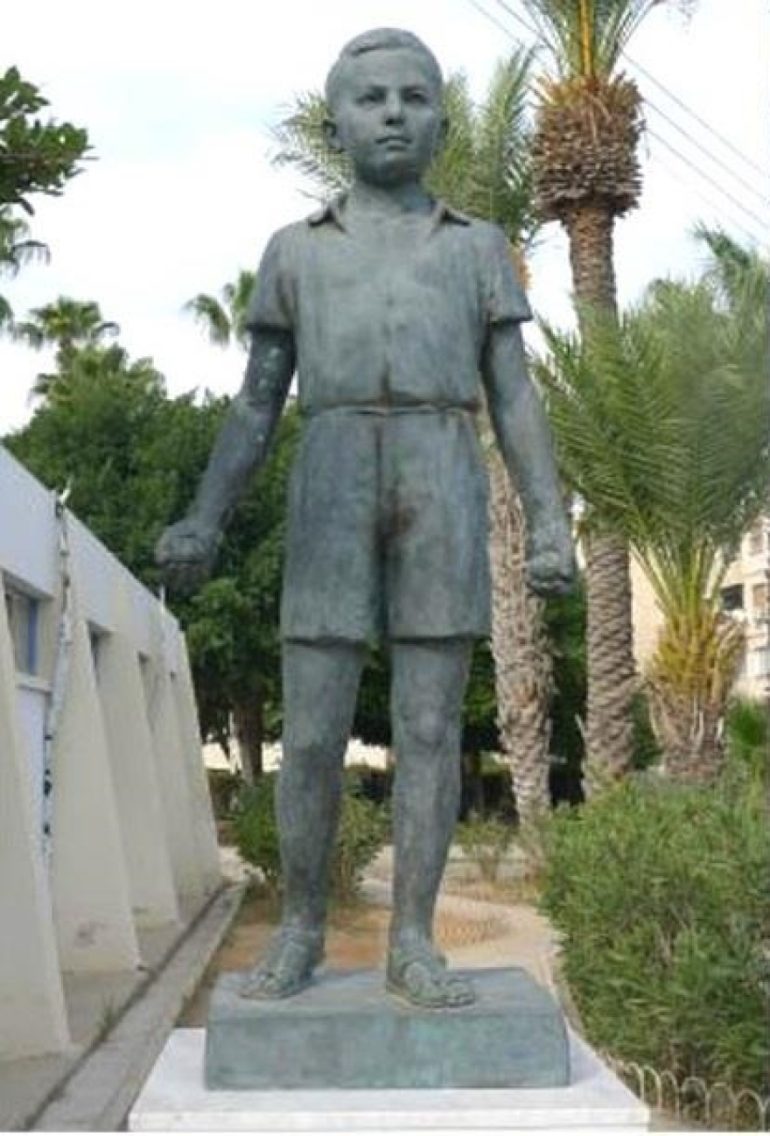He was killed by a British soldier with the third shot when he tried to give the stones he was holding to two other students.
The Anthropological Laboratory of the Republic of Cyprus has identified the bones of the youngest EOKA hero who was killed in 1956 by the British in Larnaca. These are the bones of 7-year-old Dimitrakis Dimitriadis, who was shot by an English soldier during a demonstration in favor of the Union of Cyprus with Greece. The bones were found in a cemetery along with other people's bones. The family was informed after DNA identification.
7-year-old Dimitrakis Dimitriadis was a student of the XNUMXnd grade of primary school. According to testimonies, on March 14, 1956, after school, instead of returning home, he went to the demonstration held by other older students and participated in the stoning of an English patrol. A soldier chased him and shot him twice without success.
The seven-year-old at some point got up to give stones to his classmates and then the Third Bullet wounded him fatally. He was taken to hospital where he was pronounced dead. Dimitrakis was living with his grandmother as his parents had divorced and his mother had moved to England. In the evenings he would return to the shops of Larnaca and sell flowers so that he could contribute to the house.
The youngest hero
It was the time when many children in Larnaca, which was a small town at the time, paraded and shouted EOKA slogans, shouted by older students, when they protested against the British. Times when the youth of Cyprus shouted and wrote on the walls, slogans in favor of the Union of Cyprus with mother Greece. During these turbulent times, a seven-year-old Dimitrakis Dimitriadis grew up in Larnaca, who was to be the youngest to die in the 1955-59 Struggle.
In the third shot
According to the testimony of Lakis Dimitriadis recently published by Phileleftheros, in 1956 he was a student in the 14rd grade and Dimitrakis in the 1956nd grade of the Kalogeras Primary School. That day, on March XNUMX, XNUMX, he went to school first and went to their house, as his younger brother would go to school later. However, when he finished school, Dimitrakis did not go home but chose to go to the anti-British demonstration, which would be organized by the older students of Larnaca schools, against the British.
Around 3 pm the demonstration of the students of Larnaca was at its peak with the students throwing stones at the British and they responding with chases and beatings in the streets of the city center. In an alley near St. Lazarus, a British soldier spotted three students stoning a British patrol. He marked and threw at the children, but they caught up and bent down. He threw a second time but again the students caught up and were covered. Then, the youngest of the students raised his small stature and tried to give the stones he was holding to the other two, to throw them to the English.
In the third shot the little student fell down. "They killed the baby", the cry was heard and word of mouth was heard all over Larnaca and the city froze, says Mr. Lakis. Some grabbed the child and ran to get him to the hospital, but it was too late. At the spot where Dimitrakis was killed by the British, there were marks of the crime, his blood and his student bag, as she fell with him after the shooting. At the hospital the doctors only said that the child had died.
The British wanted the funeral to take place the same night
Dimitrakis Dimitriadis, the lively and lifelong student of Kalogeras Primary School, would not go to school again. But even in the evenings and afternoons he would not sell flowers again to earn his living, since he came from a poor family. "He would never again be thirsty for a demonstration against the British, the love for the Union and Greece, which made the children go to the demonstrations and confront the British soldiers," Lakis recalls.
He had managed to learn some things about Greece and he had managed to put himself in and love Greece. "He went to the demonstrations against the British, because he felt it, because he wanted to show, like all children, that he did not want them."
Mr. Lakis remembers that late in the afternoon his father went by bicycle to the arena where he was playing and told him to go where Dimitrakis fell. They picked up his student bag and took it home. Mr. Lakis remembers that late at night the British soldiers went to their poor house and asked his father to go at night to bury Dimitrakis, so that many people would not know what happened and he was killed.
However, his father refused and the British did not insist.
